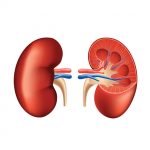 New research finds that obesity in the elderly results in poor kidney function. Obesity in general, but more so in the elderly, is linked with many health consequences – like diabetes and poor cardiovascular health.
New research finds that obesity in the elderly results in poor kidney function. Obesity in general, but more so in the elderly, is linked with many health consequences – like diabetes and poor cardiovascular health.
Specific to poor kidney function, obese elders are at a much greater risk of renal disease. Data collected from 57 studies clearly linked obesity in the elderly with mortality as well as kidney disease. The median age of participants in the study was 79 years. Furthermore, additional research shows that greater disparity between waist-to-hip ratios is a large indicator of renal failure in the elderly. The majority of research which focuses on fat around the abdomen strongly links obesity with renal failure in the elderly.
How obesity affects kidney function
Advertisement
 Published in The Lancet Diabetes and Endocrinology, researchers uncovered that obesity in the elderly directly affects kidney function. Researchers studied a national cohort of 3,376,187 veterans – mean age of 60 – with kidney function of at least 60 mL/min/1.72m2.
Published in The Lancet Diabetes and Endocrinology, researchers uncovered that obesity in the elderly directly affects kidney function. Researchers studied a national cohort of 3,376,187 veterans – mean age of 60 – with kidney function of at least 60 mL/min/1.72m2.
From the group 274,764 experienced a rapid decline in kidney function denotating their glomerular filtration rate – measurement of kidney function – was reduced below 5 mL/min/1.73m2 annually.
The researchers pointed out a strong correlation between a higher body mass index (BMI) and a decline in kidney function for participants over the age of 40. In patients younger than 40, BMI was not a contributing factor to worsened kidney function. Patients with a BMI of at least 25 – what is considered overweight – didn’t have rapid decline in kidney function.
Researchers believe that obesity negatively impacts mechanisms in the body – either directly or indirectly. The researchers wrote, “It is thus possible that progressive loss of kidney function becomes most obvious in individuals who were exposed to the effects of obesity for the longest time, which could explain the accentuation of this association with older age in our study.”
The study was primarily done on males who were veterans, so findings may not be conclusive on women or the general population. Additionally, research may be required on other populations as well to determine a direct correlation.
Obesity and kidney disease
 Obesity is largely becoming a national problem with roughly 65 percent of Americans being overweight. Obesity is commonly associated with diabetes, stroke, some cancers and heart disease, but its impact on kidney disease is rarely discussed. Much research supports the link between obesity and kidney disease.
Obesity is largely becoming a national problem with roughly 65 percent of Americans being overweight. Obesity is commonly associated with diabetes, stroke, some cancers and heart disease, but its impact on kidney disease is rarely discussed. Much research supports the link between obesity and kidney disease.
Being obese raises blood pressure which puts added stress on the kidneys. Additionally, obesity can contribute to glomerular hyperfiltration where the kidneys overproduce pro-urine – protein in the urine. Overtime such changes to the kidneys lead to damage due to blood flow issues. Furthermore, being obese for many years allows for more protein to be released from the kidneys and loss of function may occur. Many obese adults also run the risk of added diabetes which can contribute to more rapid decline of kidney function.
In order to avoid complications to the kidneys caused by obesity, taking necessary measures to reduce weight is essential.
How obese elderly can reduce their risk of kidney disease
Advertisement
There are many ways the elderly can reduce their risk of kidney disease, starting from losing weight to partaking in kidney-friendly habits. First let’s explore how the elderly can help reduce weight.
- Follow a healthy eating plan: If you are unsure how, you can always speak with your doctor, nutritionist or dietician for advice and support.
- Focus on portion size: When you eat at home controlling portions may be easier. For example, cook less food or use smaller plates – it will trick the mind into believing you consumed more food. When you go out to a restaurant to eat immediately ask for a take-home box to put half the meal in there.
- Increase physical activity: To lose weight you need to burn calories, so either begin exercising or increase your physical activity.
- Watch less TV: Sitting for extended hours continues to be associated with many health concerns, obesity included.
- Monitor your weight: Better yet, make attainable goals and stick to reaching them.
Additionally, from losing weight – which won’t only help your kidneys but improve your overall health – there are kidney-specific habits you can try to improve their function as well.
- Drink plenty of water to flush out toxins.
- Eat a healthy, balanced diet.
- Monitor and control your blood pressure.
- Don’t smoke or consume excess alcohol.
- Control and monitor your diabetes.
- Maintain healthy cholesterol.
- Take medications as directed.
- Minimize your salt intake.
- Eat small amounts of protein or stick with plant-based protein.
- Eat heart-healthy foods as well like fruits, vegetables and fish.
- Get adequate potassium.
As obesity contributes to many chronic diseases, your best defense against illness is to maintain a healthy weight. If losing weight is difficult, don’t be afraid to speak with your doctor who can provide guidance to get you on the right path.
